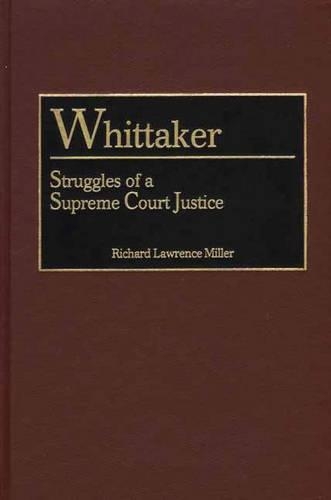
Whittaker: Struggles of a Supreme Court Justice
(Hardback)
Publishing Details
Whittaker: Struggles of a Supreme Court Justice
By (Author) Richard L. Miller
Bloomsbury Publishing PLC
Praeger Publishers Inc
30th November 2001
United States
Classifications
Tertiary Education
Non Fiction
Jurisprudence and general issues
Biography: general
Constitutional and administrative law: general
History: specific events and topics
340.092
Physical Properties
Hardback
200
Width 156mm, Height 235mm
454g
Description
The life and career of a largely forgotten Supreme Court justice Charles E. Whittaker. A Kansas farm boy, who talked his way into law school despite his lack of a high school diploma, Charles E. Whittaker was admitted to the bar before graduation and became the stereotype of a demanding, workaholic attorney. In a thirty-year practice representing Midwest corporations, he became universally admired among Missouri lawyers, and the American Bar Association called him one of the best selections ever made for the Supreme Court. Yet the very characteristics that made Whittaker one of the most acclaimed choices ensured that his service would be catastrophic both for the Court and for him. By the time he left that bench, legal scholars considered his performance on the Court as one of the saddest. Whittaker was apolitical, yet won judicial appointments requiring strong support from politicians of national strength. He was a hard-line "law and order" judge who was horrified by the death penalty. During the turbulent 1960s, he called for rational discussion of public issues, yet gave inflammatory speeches linking the civil rights movement to communism. He was the epitome of his era's Main Street conservatism. Most biographies of justices deal with those who had great influence on law and society. From an institutional standpoint, however, this study of "a justice who failed" sharpens our understanding of how the U.S. Supreme Court differs from other judicial bodies and fills a surprising gap in the Court's history.
Author Bio
Richard Lawrence Miller is an independent scholar._His pioneering biography of Harry Truman's rise to power generated controversy. He challenged assumptions of America's foreign policy establishment in Heritage of Fear: Illusion and Reality in the Cold War. His books The Case for Legalizing Drugs and Drug Warriors and Their Prey became classics among drug war skeptics. Nazi Justiz probed the question of why people decide to destroy their neighbors.
